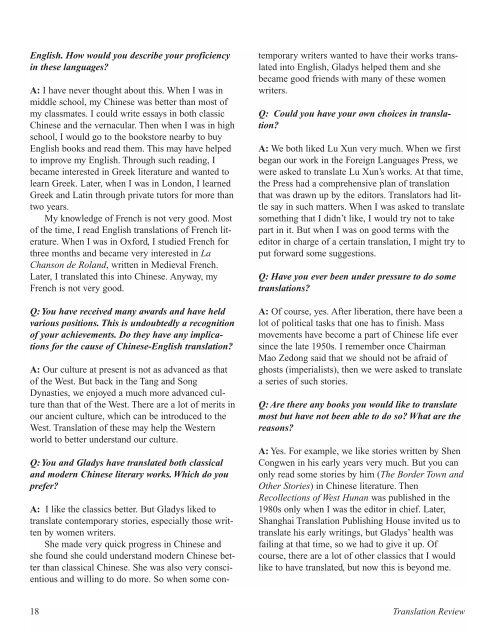Translation Review - The University of Texas at Dallas
Translation Review - The University of Texas at Dallas
Translation Review - The University of Texas at Dallas
Create successful ePaper yourself
Turn your PDF publications into a flip-book with our unique Google optimized e-Paper software.
English. How would you describe your pr<strong>of</strong>iciency<br />
in these languages?<br />
A: I have never thought about this. When I was in<br />
middle school, my Chinese was better than most <strong>of</strong><br />
my classm<strong>at</strong>es. I could write essays in both classic<br />
Chinese and the vernacular. <strong>The</strong>n when I was in high<br />
school, I would go to the bookstore nearby to buy<br />
English books and read them. This may have helped<br />
to improve my English. Through such reading, I<br />
became interested in Greek liter<strong>at</strong>ure and wanted to<br />
learn Greek. L<strong>at</strong>er, when I was in London, I learned<br />
Greek and L<strong>at</strong>in through priv<strong>at</strong>e tutors for more than<br />
two years.<br />
My knowledge <strong>of</strong> French is not very good. Most<br />
<strong>of</strong> the time, I read English transl<strong>at</strong>ions <strong>of</strong> French liter<strong>at</strong>ure.<br />
When I was in Oxford, I studied French for<br />
three months and became very interested in La<br />
Chanson de Roland, written in Medieval French.<br />
L<strong>at</strong>er, I transl<strong>at</strong>ed this into Chinese. Anyway, my<br />
French is not very good.<br />
Q:You have received many awards and have held<br />
various positions. This is undoubtedly a recognition<br />
<strong>of</strong> your achievements. Do they have any implic<strong>at</strong>ions<br />
for the cause <strong>of</strong> Chinese-English transl<strong>at</strong>ion?<br />
A: Our culture <strong>at</strong> present is not as advanced as th<strong>at</strong><br />
<strong>of</strong> the West. But back in the Tang and Song<br />
Dynasties, we enjoyed a much more advanced culture<br />
than th<strong>at</strong> <strong>of</strong> the West. <strong>The</strong>re are a lot <strong>of</strong> merits in<br />
our ancient culture, which can be introduced to the<br />
West. <strong>Transl<strong>at</strong>ion</strong> <strong>of</strong> these may help the Western<br />
world to better understand our culture.<br />
Q:You and Gladys have transl<strong>at</strong>ed both classical<br />
and modern Chinese literary works. Which do you<br />
prefer?<br />
A: I like the classics better. But Gladys liked to<br />
transl<strong>at</strong>e contemporary stories, especially those written<br />
by women writers.<br />
She made very quick progress in Chinese and<br />
she found she could understand modern Chinese better<br />
than classical Chinese. She was also very conscientious<br />
and willing to do more. So when some con-<br />
temporary writers wanted to have their works transl<strong>at</strong>ed<br />
into English, Gladys helped them and she<br />
became good friends with many <strong>of</strong> these women<br />
writers.<br />
Q: Could you have your own choices in transl<strong>at</strong>ion?<br />
A: We both liked Lu Xun very much. When we first<br />
began our work in the Foreign Languages Press, we<br />
were asked to transl<strong>at</strong>e Lu Xun’s works. At th<strong>at</strong> time,<br />
the Press had a comprehensive plan <strong>of</strong> transl<strong>at</strong>ion<br />
th<strong>at</strong> was drawn up by the editors. Transl<strong>at</strong>ors had little<br />
say in such m<strong>at</strong>ters. When I was asked to transl<strong>at</strong>e<br />
something th<strong>at</strong> I didn’t like, I would try not to take<br />
part in it. But when I was on good terms with the<br />
editor in charge <strong>of</strong> a certain transl<strong>at</strong>ion, I might try to<br />
put forward some suggestions.<br />
Q: Have you ever been under pressure to do some<br />
transl<strong>at</strong>ions?<br />
A: Of course, yes. After liber<strong>at</strong>ion, there have been a<br />
lot <strong>of</strong> political tasks th<strong>at</strong> one has to finish. Mass<br />
movements have become a part <strong>of</strong> Chinese life ever<br />
since the l<strong>at</strong>e 1950s. I remember once Chairman<br />
Mao Zedong said th<strong>at</strong> we should not be afraid <strong>of</strong><br />
ghosts (imperialists), then we were asked to transl<strong>at</strong>e<br />
a series <strong>of</strong> such stories.<br />
Q: Are there any books you would like to transl<strong>at</strong>e<br />
most but have not been able to do so? Wh<strong>at</strong> are the<br />
reasons?<br />
A: Yes. For example, we like stories written by Shen<br />
Congwen in his early years very much. But you can<br />
only read some stories by him (<strong>The</strong> Border Town and<br />
Other Stories) in Chinese liter<strong>at</strong>ure. <strong>The</strong>n<br />
Recollections <strong>of</strong> West Hunan was published in the<br />
1980s only when I was the editor in chief. L<strong>at</strong>er,<br />
Shanghai <strong>Transl<strong>at</strong>ion</strong> Publishing House invited us to<br />
transl<strong>at</strong>e his early writings, but Gladys’ health was<br />
failing <strong>at</strong> th<strong>at</strong> time, so we had to give it up. Of<br />
course, there are a lot <strong>of</strong> other classics th<strong>at</strong> I would<br />
like to have transl<strong>at</strong>ed, but now this is beyond me.<br />
18 <strong>Transl<strong>at</strong>ion</strong> <strong>Review</strong>

















